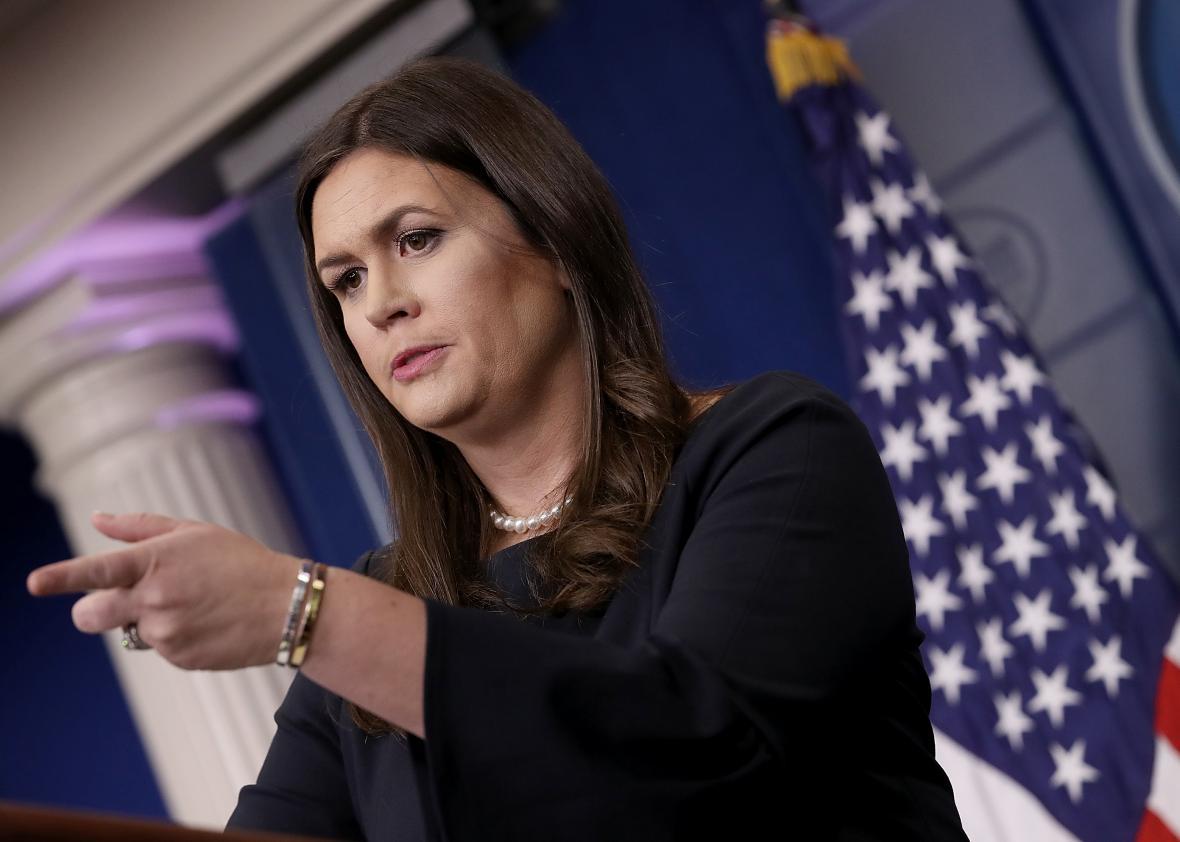Press Secretary Sarah Huckabee Sanders stood behind the White House lectern on Monday to perform more willful density about the meaning of this weekend’s NFL protests. After describing Trump’s strenuous efforts to sign a memo (which directed Security of Education Betsy DeVos to establish STEM guidelines for high school curricula), she noted that we are coming up on the 60th anniversary of the Little Rock Nine, whom she spoke of reverently as “American heroes.” Then, civil rights credentials established, Sanders took questions from reporters.
Asked about a rally in which Trump referred to black athletes protesting police brutality as “sons of bitches” who should be fired, Sanders clarified that the President is not “against” anything, especially not the first amendment or black people. He is simply “for” national pride, the flag, the anthem, and the troops. “It is always appropriate for the President to defend” patriotic insignia, Sanders said, before quoting at length from a op-ed by General Martin Dempsey about the glories of our volunteer military. “We still have work to do,” Dempsey had conceded in his piece, but “what is right about America … is worth honoring.”
Sanders ably sidestepped the notion that these protests are about what’s wrong with America, not what’s right. As for the criticism that Trump spent hours feverishly tweeting about sports instead of focusing on Puerto Rico or the Graham-Cassidy health care bill, she championed the President’s instinct to “always emphasize … something that should be unifying, celebrating, and promoting patriotism in our country.”
But how is calling football players “sons of bitches” unifying, one reporter wanted to know. Also, how can the POTUS ignore the racial underpinnings of his tweets and of the players’ demonstrations?
This was Sanders’ cue to argue that the “focus and message” of the gridiron kneeling has morphed. “If they are upset about police brutality,” she said of the players, then they should “protest the officers on the field that are protecting them instead of the American flag.”
Was she actually suggesting that athletes confront members of law enforcement in the pre-game ceremonies?
“No, no … I was pointing out the hypocrisy of the fact that if the goal is and the message is of police brutality, which they’ve stated, then that doesn’t seem very appropriate to protest the American flag.”
Unfortunately no one asked her what makes her think these football players are protesting the American flag, which they are not doing, because they are actually protesting police brutality, which is apparently a thing she would, hypothetically, support them doing, if only they weren’t protesting the American flag, which they are not protesting.
In other news, Sanders called the idea that the United States might be at war with Kim Jong-un “absurd” and reaffirmed the administration’s commitment to peacefully disarming the Korean peninsula. She rejected the accusation that aid to Puerto Rico was moving slowly. She said that the National Security Council was delighted with Trump’s UN speech. (She also denied that the President was dragging his feet on placing a congratulatory phone call to Germany’s Angela Merkel, which is a hilarious thought and so him.) Still, those ancillary affronts to thinking people—or really anyone who has watched TV or opened Twitter in the past few weeks—paled in comparison to Sanders’ sneaky attempt to reroute an urgent conversation about state-sanctioned racist violence.
